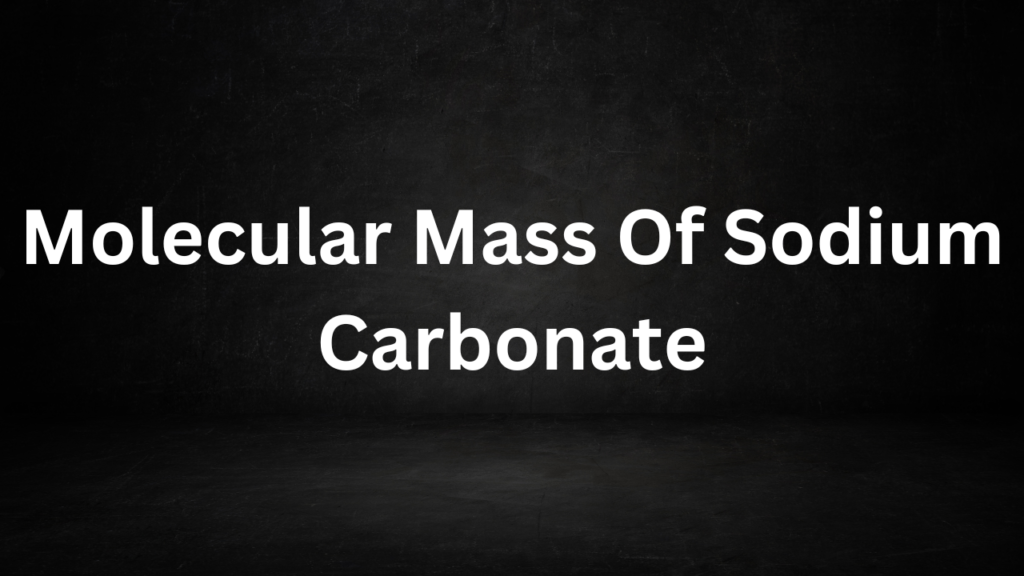Tag: Molecular Mass Of Sodium Carbonate
Molecular Mass Of Sodium Carbonate
Molecular Mass Of Sodium Carbonate: Sodium carbonate, also known as soda ash or washing soda, is a versatile chemical compound with numerous applications, ranging from household cleaning to industrial processes.
In the field of chemistry, understanding the mole mass of sodium carbonate plays a pivotal role in various calculations, especially those related to chemical reactions, stoichiometry, and solution preparations. In this article, we’ll explore molar mass, its significance in chemistry, and calculate the molar mass of sodium carbonate (Na2CO3).

Molecular Mass Of Sodium Carbonate
Molecular Mass: A Foundational Concept
The Molecular mass, also referred to as mole weight or molar mass, is a fundamental concept in chemistry. It denotes the mass of a single mole of a substance, commonly expressed in atomic mass units (amu) or unified atomic mass units (u). To calculate the molar mass of a compound, add the atomic masses of all its constituent atoms, considering their relative proportions.
Calculating the Molecular Mass of Sodium Carbonate
To calculate the mole mass of sodium carbonate (Na2CO3), we must first determine the atomic masses of the elements: sodium (Na), carbon (C), and oxygen (O), and then apply these values to the chemical formula.
- Sodium (Na): The atomic mass of sodium is approximately 22.99 amu.
- Carbon (C): The atomic mass of carbon is approximately 12.01 amu.
- Oxygen (O): The atomic mass of oxygen is approximately 16.00 amu.
Now, let’s calculate the molecular mass of sodium carbonate:
Molecular Mass of Na2CO3 = (2 × Atomic Mass of Na) + (1 × Atomic Mass of C) + (3 × Atomic Mass of O)
The Molecular Mass of Na2CO3 = (2 × 22.99 amu) + (1 × 12.01 amu) + (3 × 16.00 amu)
Molecular Mass of Na2CO3 = 45.98 amu + 12.01 amu + 48.00 amu
Molecular Mass of Na2CO3 = 105.99 amu
So, the molecular mass of sodium carbonate (Na2CO3) is approximately 105.99 amu.
Significance of Molecular Mass of Sodium Carbonate
The mole mass of sodium carbonate holds significant importance in various aspects of chemistry:
- Stoichiometry: Mole mass is crucial in stoichiometry, allowing chemists to balance chemical equations and determine the quantities of reactants and products involved in chemical reactions with sodium carbonate.
- Solution Preparation: In laboratories and industries, knowledge of the mole mass is essential for accurately preparing sodium carbonate solutions with specific concentrations, ensuring precise measurements.
- Industrial Applications: Sodium carbonate is widely used in industries such as glass manufacturing, detergents, and water treatment. Understanding its mole mass is vital for quality control and process optimization.
- Household Uses: Sodium carbonate is commonly found in household cleaning products, and its mole mass can help consumers understand product concentrations and efficacy.
- Safety: Knowing the mole mass of sodium carbonate is essential for handling it safely, especially in industrial and laboratory settings, as it assists in determining appropriate safety protocols and precautions.
Conclusion
The mole mass of sodium carbonate (Na2CO3) is a fundamental concept in chemistry, holding practical importance in various applications. Finding molar mass empowers informed choices, precise experiments, and optimized sodium carbonate use in various contexts. Comprehending this essential parameter amplifies our capacity to utilize sodium carbonate’s versatility across diverse chemical processes and applications.
Read More
- Molecular Mass Of Nitric Acid
- Molecular Mass Of Sulphuric Acid
- Molar Mass Of Sulphuric Acid
- Types Of Motion In Physics
- Kinetic Energy Class 9
Frequently Asked Questions (FAQs) On Molecular Mass Of Sodium Carbonate
1. What is the molecular formula of sodium carbonate?
The mole formula of sodium carbonate is Na2CO3, representing two sodium atoms (Na), one carbon atom (C), and three oxygen atoms (O) in a single molecule.
2. What does molecular mass or molar mass mean in chemistry?
Molecular mass, also known as molar mass, refers to the mass of one mole of a substance and is typically expressed in atomic mass units (amu) or unified atomic mass units (u). It is a fundamental concept in chemistry used for various calculations.
3. Why is the molecular mass of sodium carbonate important in chemistry?
The mole mass of sodium carbonate is essential in chemistry because it helps determine the quantity of sodium carbonate involved in chemical reactions, stoichiometry, and solution preparations.
4. How is the molecular mass of sodium carbonate calculated?
To calculate the mole mass of sodium carbonate (Na2CO3), you sum the atomic masses of all the atoms in its chemical formula, taking into account their respective proportions.
5. What is the molecular mass of sodium carbonate (Na2CO3)?
The mole mass of sodium carbonate is approximately 105.99 amu.